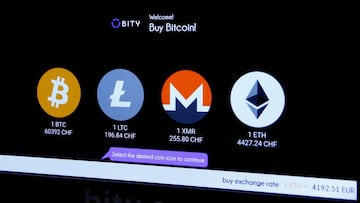Cryptocurrency: who controls the prices of Bitcoin and altcoins?
Even Bitcoin, which is not a teenager in the currency world, is being passed on by some looking for even more anonymity, and free of central control.

If you're looking for an anonymous currency these days, then even Bitcoin isn't providing enough seclusion for a certain group, who have turned to a volatile class of crypto known as privacy coins.
Bitcoin and the need for more privacy
These 'coins' have been created with the primary aim of masking the identity of users as well as the details of transactions, and have quietly been gaining traction this month as maturing bitcoin inches towards mainstream finance. Monero and Zcash, among the most popular, have respectively gained 7.6% and 46% since 1 March, according to CoinMarketCap data, even as bitcoin has lost about 5%. The pair has gained 4.7% and 16% in the past week. An index tracking privacy coins more broadly, compiled by research firm Macro Hive, has risen 4%.
This could be a blip in the wild ride of privacy coins, which conceal more information about transaction amounts and parties through differences in their underlying blockchains. In the past five years, Monero's market cap - the total value of all the coin out there - has pinballed from $100 million to $6.8 billion to $3.4 billion now, according to CoinMarketCap data.
in related news:
- John Terry, soccer and the future of NFTs in sport
- What is the Crypto executive order that Biden will address this week?
- Do you have to declare your cryptocurrencies transactions to the IRS?
- What is Coinbase? What was the company's Super Bowl commercial?
- How is cryptocurrency taxed?
Yet the interest in crypto privacy coincides with bitcoin's diminishing function as an anonymous currency. It also comes against the backdrop of war in Europe, a tightening sanctions dragnet and strong noises from policymakers in the United States, EU and Japan about regulating the crypto market.
Aidan Arasasingham and Gerard DiPippo, of the Washington-based Center for Strategic and International Studies, note that bitcoin is not truly anonymous, but rather pseudonymous, where coins can be held in wallets opened under alternative or false names.
"If a wallet can be linked to an entity or person, the actor can be identified," they wrote in a report in the context of the possibility of crypto being used in Russia and Ukraine to move funds. "Their transactions and wallets can be traced."
Volatility aside, though, there are several obstacles that keep privacy coins from being a top-tier altcoin, or alternative to bitcoin, which has a market cap of around $776 billion. Some major crypto exchanges do not list privacy coins due to their potential for illicit activity, for example. Daily trading volumes for Monero have mostly been under $250 million this month while altcoin Ripple sees more than $1.5 billion changing hands each day.
"Privacy coins will probably grow. The challenge is that you have to do a lot of things do make them anonymous that make for a horrible user experience and adds big transaction costs," said Dave Siemer, CEO at asset management firm Wave Financial in Los Angeles who owns some Monero coins.
Tracking Bitcoins down to the last satoshi
Privacy coins have evolved in recent years as the ability of authorities to track blockchain activity for bitcoin and other major cryptocurrencies has become more advanced.
"Coins can, with some effort, be traced back to the very last "satoshi", bitcoin's smallest unit," Teunis Brosens, head economist of digital finance and regulation at ING, said in a note. "Recent reports of ransomware money being recaptured, and arrests made for crypto exchange hacks made years ago, attest to this progress."
NEW: Florida governor confirms the state is working on a plan to let businesses pay taxes in #bitcoin and crypto pic.twitter.com/dBJJjXEsom
— Bitcoin Magazine (@BitcoinMagazine) March 22, 2022
Large regulators have the crypto market in the sights, with efforts intensified by concerns that Russian oligarchs and other sanctioned people could use bitcoin to clandestinely move money.
U.S. senators have introduced a bill that could give the president power to sanction foreign cryptocurrency firms. The European Union has also voted in favor of comprehensive digital asset legislation. Japan's Financial Services Agency has said it will punish anyone making unauthorized payments to those targeted by the sanctions.
What's Bitcoin doing?
Bitcoin's movements have been contained in part by the Ukraine conflict and the Federal Reserve's hawkishness. The crypto kingpin has been stuck between $35,000 and $45,000 since mid-January, unable to reach the $50,000 level it held at the end of 2021. A bitcoin long-to-short positions ratio on Binance is at 1.5, the same level it was at on 24 February when Russia invaded.
Meanwhile data from Glassnode shows a jump in the proportion of bitcoin supply being absorbed by entities with a low statistical history of spending it. Marcus Sotiriou, analyst at UK-based digital asset broker GlobalBlock, sees this as "suggesting a bullish market structure for the medium-long term".
"Bitcoin is consolidating under $41,000, as the percentage of long-term holders in the market continues to increase," Sotiriou said.
The background to Bitcoin
Bitcoin came into existence in 2009 after the concept of a decentralized digital currency was presented by its mysterious creator Satoshi Nakamoto. Since then, it has become the standard for a raft of other cryptocurrencies that use peer-to-peer networks to keep a ledger of all transactions.
IYKYK
— Anthony Scaramucci (@Scaramucci) March 22, 2022
Bridgewater Hedge Fund Is Set to Make Major Bitcoin Investment https://t.co/WOtMipSEGp
This decentralized system of using cryptography and numerous servers for recording and storing the account book of all transactions provides the means by which miners get paid and underpins the security of currency.
How does Bitcoin work?
In 2008 an academic white paper titled Bitcoin: A Peer-to-Peer Electronic Cash System by Satoshi Nakamoto, an invented name, laid out the system that would become the cryptocurrency Bitcoin. The digital coin is built on a decentralized peer-to-peer network that uses open-source software, so anyone can participate in maintaining the public ledger of all transactions.
Transactions are broadcast to the network and shared amongst all the servers, or nodes, which then reach a consensus on the transactions and include them in “blocks”. These are placed into the “blockchain” which stacks the information so that there is a permanent record of all transactions, decreasing the risk of a reverse transaction.
What is Bitcoin mining?
The peer-to-peer software that allows people around the globe to send Bitcoin money to each other also lets people provide their servers to process the transactions. The people who perform this service are known as "miners" and their computers synchronize the record of transactions establishing a consensus and thus secure the network.
For collecting the information and placing it on the blockchain miners receive a transaction fee. But they can also get Bitcoin for adding a new block onto the blockchain. This is done by completing a cryptographic calculation. The first miner to broadcast the next block is rewarded with a Bitcoin. However, over time it gets harder to mine new coins which are limited to 21 million in total.
What is the value of Bitcoin?
The value of this digital money is based on mathematics, instead of a physical property or government fiat. “As with all currency, Bitcoin's value comes only and directly from people willing to accept them as payment.”
Just as with regular currencies or precious metals the value of Bitcoins fluctuate, but they are not legal tender in any country. However, individuals and businesses are using the cryptocurrency for transactions worth millions of dollars everyday.
Related stories
The value of a Bitcoin has seen spikes in the past only to decrease again. In the autumn of 2020 the value skyrocketed only to lose nearly half its gains the following spring. However, just a matter of months later, the cryptocurrency began climbing again, to almost double going over $68,000 briefly in November 2021.
The maximum number of Bitcoins is limited to 21 million, but each coin can be split into subunits. Currently there are 1,000,000 bits in one bitcoin, or divided up into 8 decimal places (0.000 000 01). If required in the future, more bits could potentially be created for ever smaller transactions. At the end of November 2021, there were just over 2.1 million Bitcoins left to be mined according to the Bitcoin supply chart.

